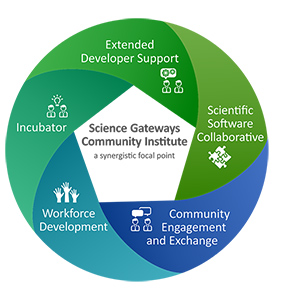
NSF Awards $15 Million to Create Science Gateways Community Institute
Multi-partner project led by SDSC to meet researchers’ needs across all science domains
Published Date
By:
- Jan Zverina
Share This:
Article Content

The National Science Foundation (NSF) has awarded a five-year $15 million grant to a collaborative team led by the San Diego Supercomputer Center (SDSC) at UC San Diego to establish a Science Gateways Community Institute to accelerate the development and application of highly functional, sustainable science gateways that address the needs of researchers across the full spectrum of NSF directorates.
The Institute’s goal is to increase the number, ease of use, and effective application of gateways for the greater research and engineering community, resulting in broader gateway use and more widespread engagement in science by professionals, citizen scientists, students, and more. The project will officially get underway starting this summer.
The award was part of a larger NSF announcement in which the agency committed $35 million to create two Scientific Software Innovation Institutes (S2I2) that will serve as long-term hubs for scientific software development, maintenance and education.
“The Institutes will ultimately impact thousands of researchers, making it possible to perform investigations that would otherwise be impossible and expanding the community of scientists able to perform research on the nation’s cyberinfrastructure,” said Rajiv Ramnath, program director in the division of Advanced Cyberinfrastructure at NSF.
A science gateway is a community-developed set of tools, applications, and data services and collections that are integrated through a web-based portal or suite of applications. Such gateways provide scientists access to many of the tools used in cutting-edge research – telescopes, seismic shake tables, supercomputers, sky surveys, undersea sensors, and more – and connect often diverse resources in easily accessible ways that save researchers and institutions time and money.
“Gateways foster collaborations and the exchange of ideas among researchers and can democratize access, providing broad access to resources sometimes unavailable to those who are not at leading research institutions.” said Nancy Wilkins-Diehr, SDSC associate director and principal investigator for the project.
“Because of Nancy’s dedication, SDSC has for many years been a leader in research using science gateways,” said SDSC Director Michael Norman. “Such gateways, including the ever-popular CIPRES (CyberInfrastructure for Phylogenetic RESearch) gateway used to explore evolutionary relationships between species, have been accessed by thousands of users via our supercomputing resources including our new Comet system.”
Wilkins-Diehr also is co-PI of the NSF-funded eXtreme Science and Engineering Discovery Environment (XSEDE) program, one of the most advanced collections of integrated digital resources and services in the world.
“In XSEDE, we have observed tremendous growth in terms of the number of gateway users, the number of processing hours used on HPC resources and the number of published research papers using gateways in the last couple of years,” said Wilkins-Diehr. “We see the services offered by SGCI dovetailing nicely with those offered by XSEDE. In the XSEDE Extended Collaborative Support (ECSS) program, our primary focus is supporting developers of existing gateways with their back-end connections to XSEDE resources. SGCI frees us up to offer services developing front ends – both for projects that use supercomputers and those that do not.”
Multiple Partnerships, Multiple Components
In early 2015, the NSF identified science gateways as one of two focus areas for the implementation phase of its Software Institute program. Through a $500,000 award, a team led by Wilkins-Diehr developed a strategic plan for a much larger Science Gateways Institute as part of that Software Institute program’s conceptualization phase.
The new SGCI award brings together expertise from a wide range of partner universities and institutions including Elizabeth City State University in North Carolina; Indiana University; University of Notre Dame; Purdue University; the Texas Advanced Computing Center (TACC) at the University of Texas, Austin; and the University of Michigan at Ann Arbor.
The Institute’s five-component design is the result of several years of studies, including many focus groups and a 5,000-person survey of the research community, including NSF principal investigators, campus CIOs and CTOs, and others. Those component areas include:

The five key areas for the Science Gateways Community Institute to increase the number, ease of use, and effective application of gateways to serve the greater research and engineering community.
- An Incubator, to provide shared expertise in business and sustainability planning, cybersecurity, user interface design, and software engineering practices. This area will be led by Michael Zentner (Information Technology at Purdue University).
- Extended Developer Support, to provide expert developers for up to one year to projects that request assistance and demonstrate the potential to achieve the most significant impacts on their research communities. Led by Marlon E. Pierce (Indiana University).
- The Scientific Software Collaborative, to oversee a component-based, open-source, extensible framework for gateway design, integration, and services, including gateway hosting and capabilities for external developers to integrate their own software into Institute offerings. Led by Maytal Dahan (TACC).
- Community Engagement and Exchange, which will provide a forum for communication and sharing experiences among gateway developers – within the NSF, across federal agencies, and internationally. Led by Katherine A. Lawrence (University of Michigan) with support from Sandra Gesing (University of Notre Dame).
- Workforce Development, to increase the pipeline of gateway developers with training programs, including special emphasis on recruiting underrepresented minorities, and by helping universities form gateway support groups. Led by Linda B. Hayden (Elizabeth City State University).
The work is funded via NSF award number is ACI-1547611 and more information about SGCI is available here.
“We’re excited about the opportunity to build community – nationally and internationally,” added Wilkins-Diehr. “Sharing expertise about basic infrastructure allows developers to concentrate on the novel, the challenging, and the cutting-edge development needed by their specific user community.
Share This:
You May Also Like
Stay in the Know
Keep up with all the latest from UC San Diego. Subscribe to the newsletter today.


